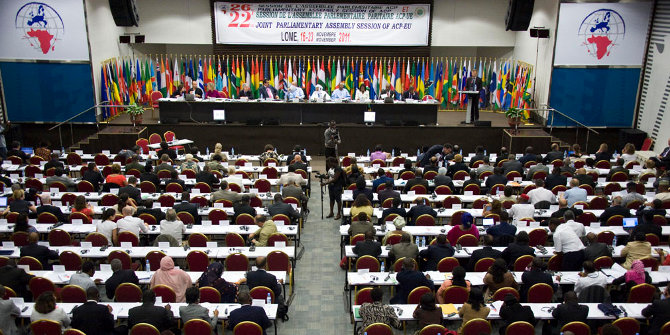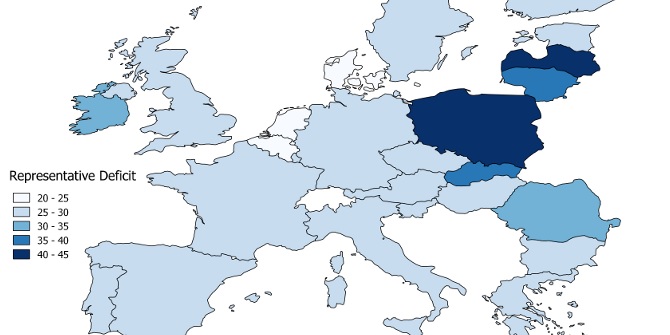 The European Development Fund (EDF) is the main instrument through which the EU provides development aid to African, Caribbean, and Pacific countries. However, there has been a long-running debate over whether the EDF should be formally integrated into the EU budget, or whether it should remain a separate fund financed by direct contributions from the EU’s member states. Johanne Døhlie Saltnes argues that while integrating the EDF into the budget has been proposed on the basis of enhancing effectiveness, it would downgrade concerns voiced by the EU’s partners in Africa, Caribbean and the Pacific and should therefore be viewed as a question of politics.
The European Development Fund (EDF) is the main instrument through which the EU provides development aid to African, Caribbean, and Pacific countries. However, there has been a long-running debate over whether the EDF should be formally integrated into the EU budget, or whether it should remain a separate fund financed by direct contributions from the EU’s member states. Johanne Døhlie Saltnes argues that while integrating the EDF into the budget has been proposed on the basis of enhancing effectiveness, it would downgrade concerns voiced by the EU’s partners in Africa, Caribbean and the Pacific and should therefore be viewed as a question of politics.

ACP-EU Joint Parliamentary Assembly in Lomé, Togo, Credit: © European Union PE-EP / Johanna Leguerre (CC BY-NC-ND 2.0)
The European Commission’s proposal for the next multiannual financial framework, the EU’s long-term budget, has once again triggered discussion about the status of the €30.5 billion European Development Fund (EDF). The EDF is the financial mechanism that provides aid to a group of 79 states in Africa, the Caribbean and the Pacific (referred to as the ACP group). These are mostly former colonies of EU member states and are the top recipients of EU aid. The EDF is directly financed by the member states and has so far remained outside the EU’s budget, thereby excluding parliamentary oversight. The Commission is now proposing to integrate its 12 different financial mechanisms to ‘further enhance effectiveness and efficiency’, a move that would integrate the EDF into the EU’s budget. However, a so-called budgetisation of the EDF has wider implications than simply ‘enhancing effectiveness’.
Civil society actors have criticised the Commission’s proposal, mainly because of its redistributive consequences. NGO representatives have voiced concerns over a shift from the long-standing development objective of poverty reduction to wider foreign policy goals such as crisis management, migration and security. Representatives from civil society also worry that the Commission’s proposal will decrease the flexibility of spending and prioritise European neighbourhood countries at the expense of the EU’s long-term African, Caribbean and Pacific receivers.
A question of politics
Concerns about the redistributive effects of the proposed budgetisation of the EDF are no doubt important. However, changes in the EU’s development budget also affect the prior political question of who decides on redistribution. Put another way, these changes affect the conditions for political justice. This is where the core political dilemma of the EDF lies, which has been the case ever since the question first appeared on the Commission’s agenda in 1973.
To secure a reasonable distribution of goods, a reasonable political structure is also necessary. Decisions on the EDF are now taken by the member states under the principle of unanimity. Moving the EDF into the budget would give the Council and the Parliament co-legislative powers and therefore imply supranational elements of decision-making. While both of these decision-making procedures are reasonable alternatives, moving the EDF from member state competence to EU competence will have implications for many different actors, including the member states, the European Parliament and the EDF-receiving partners in Africa, the Caribbean and the Pacific. Hence, reforms of the decision-making structure of a €30 billion budget require justification.
The Commission’s proposal to budgetise the EDF rests primarily on pragmatic arguments about efficiency and coherence. However, streamlining all EU development funds could harm long-term efforts to build a partnership with its counterparts in Africa, the Caribbean and the Pacific.
Taking partnership seriously?
The ACP group have been an important critic of the budgetisation proposal. In a statement published on 30 May, the group stated that they were “strongly in favour of maintaining the European Development Fund (EDF) as the main financial instrument in support of ACP-EU development cooperation.” They noted that “one of its unique features is the fact that it is managed outside of the general EU budget” and that “the EDF has fostered a particular culture that has made the ACP-EU partnership a unique development cooperation model”.
The extent to which partnerships between aid donors and recipients are ‘real’ partnerships or simply elite rhetoric is a recurring theme in debates on development policies. While accusations of using the language of partnership only for strategic purposes are frequent, some characteristics of the EU-ACP relationship are indicative of at least elements of a ‘real’ partnership. Institutions like the joint EU-ACP Council of Ministers and the joint EU-ACP Parliamentary Assembly are examples of a joint ownership model that builds mutual accountability. Furthermore, the language of partnership is not only used by the EU. The ACP statement reflects that the ACP-EU partnership model is also considered valuable by the ACP group.
In political philosophy, proponents of the principle of mutual recognition emphasise that to reach just decisions it is imperative to give a due hearing to all affected parties. Arguably, collaborative institutional frameworks such as those established in the ACP-EU partnership might be better equipped to absorb the particular concerns of those affected by the policy than a standardised EU budget procedure.
Enhancing democratic legitimacy?
The European Parliament has been a long-time defender of budgetisation of the EDF. Integration in the budget would increase transparency and give the Parliament powers over scrutiny and approval. The Parliament’s long-voiced argument is that budgetisation would increase the democratic legitimacy of EU foreign policy. The Head of the Development Committee in the Parliament, Linda McAvan, recently told the press that a move to budgetise the fund would be ‘welcomed across the house’.
However, recent developments, such as the UK’s decision to exit the EU, have put the Parliament’s call for scrutiny, transparency and oversight to one side. Anonymous research interviews with European Parliament officials reveal that many representatives are still concerned about budgetisation of the EDF taking place simultaneously with the Brexit negotiations. Keeping the EDF outside the budget would make UK contributions to EU development policy beyond Brexit easier. The potential loss of the UK’s contribution to the EDF is perhaps a more important issue than that of parliamentary oversight. So far, the EDF has not been open to non-EU donors. However, the Brexit negotiations involve the possibility of opening EU aid instruments up to non-EU countries and thereby maintaining the possibility of UK contributions.
The UK’s contribution to the EDF currently amounts to 15% of the EDF budget. However, the UK is also a key representative of the so-called like-minded group of donors, incorporating the UK, Ireland, the Nordic countries, and the Netherlands. These countries often act in tandem by arguing for an EU development policy which prioritises the least developed countries, promotes gender mainstreaming, and supports increased ownership by the recipients of aid. A UK exit from European development policy would probably weaken the like-minded group’s overall influence on the Union’s development policy.
EU development policy at a crossroads
The EU’s development policy is at a crossroads. This is not only due to the proposed changes to the EU’s budget. Negotiations are also due to start on a new partnership agreement with the African, Caribbean and Pacific states: the so called ‘Post-Cotonou agreement’ which will take over from the ACP-EU partnership agreement signed in Cotonou, Benin, in 2000, that is due to expire in February 2020. The UK’s potential exit from the EDF promises to throw a further spanner in the works.
Whether the EDF will be integrated into the budget will be decided by unanimity in the Council. Even if the Commission manages to convince the member states that budgetisation is the best way forward, such a move would undermine concerns voiced by its main development partner, the ACP states. It may also make it more difficult to integrate significant British contributions post-Brexit into the overall coordinated European effort for development in Africa, the Caribbean and the Pacific.
Please read our comments policy before commenting.
Note: This article gives the views of the author, not the position of EUROPP – European Politics and Policy or the London School of Economics.
_________________________________
 Johanne Døhlie Saltnes – University of Oslo
Johanne Døhlie Saltnes – University of Oslo
Johanne Døhlie Saltnes is a Researcher at ARENA – Centre for European Studies, University of Oslo & Researcher in the GLOBUS project.





